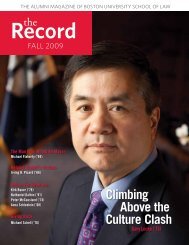the nature of representation: the cherokee right ... - Boston University
the nature of representation: the cherokee right ... - Boston University
the nature of representation: the cherokee right ... - Boston University
You also want an ePaper? Increase the reach of your titles
YUMPU automatically turns print PDFs into web optimized ePapers that Google loves.
94 PUBLIC INTEREST LAW JOURNAL [Vol. 15<br />
American claims <strong>of</strong> being a moral society. Ralph Waldo Emerson wrote <strong>of</strong><br />
removal to <strong>the</strong>n President Martin Van Buren:<br />
Sir, does this government think that <strong>the</strong> people <strong>of</strong> <strong>the</strong> United States are<br />
become savage and mad? From <strong>the</strong>ir minds are <strong>the</strong> sentiments <strong>of</strong> love and a<br />
good <strong>nature</strong> wiped clean out? The soul <strong>of</strong> man, <strong>the</strong> justice, <strong>the</strong> mercy that is<br />
that heart’s heart in all men, from Maine to Georgia, does abhor this<br />
business. 4<br />
As Daniel Webster stated in a speech from this period, <strong>the</strong>re existed “a strong and<br />
growing feeling in <strong>the</strong> country that great wrong has been done to <strong>the</strong> Cherokees.” 5<br />
In 1830, an increasingly prosperous and assimilated Cherokee people were living<br />
on land guaranteed for <strong>the</strong>m by treaties with <strong>the</strong> U.S. government. 6 By 1840, <strong>the</strong><br />
U.S. military had forced Cherokees to relocate west <strong>of</strong> <strong>the</strong> Mississippi, a process in<br />
which <strong>the</strong> Cherokees lost “at least 4,000 and perhaps as many as 8,000” <strong>of</strong> <strong>the</strong>ir<br />
tribe in <strong>the</strong> infamous ‘Trail <strong>of</strong> Tears,’ as well as <strong>the</strong>ir political <strong>right</strong> to claim <strong>the</strong>ir<br />
eastern lands. 7<br />
The Cherokee nation, under Principal Chief John Ross, repeatedly highlighted<br />
<strong>the</strong> inherent wrong in removal in order to convince both politicians and <strong>the</strong><br />
American public to not allow removal. Cherokee messages, to Congress, <strong>the</strong><br />
press, and influential Americans focused first on <strong>the</strong> illegality <strong>of</strong> removal in light <strong>of</strong><br />
<strong>the</strong> many treaties <strong>the</strong> Cherokees had signed with <strong>the</strong> U.S. government. 8<br />
Fur<strong>the</strong>rmore, Cherokee leaders expanded <strong>the</strong>ir focus beyond <strong>the</strong> law: “The idea <strong>of</strong><br />
<strong>the</strong> Cherokee Nation as a test <strong>of</strong> American virtue clearly appealed to tribal leaders,<br />
and <strong>the</strong>y adopted this element <strong>of</strong> <strong>the</strong> reformers’ worldview. Cherokee writings<br />
continually reminded non-Indians that God and <strong>the</strong> rest <strong>of</strong> <strong>the</strong> world were<br />
watching....” 9 While Andrew Jackson agreed with <strong>the</strong> <strong>the</strong>n Governor <strong>of</strong><br />
Georgia, Wilson Lumpkin, that a “savage race <strong>of</strong> hea<strong>the</strong>ns” had no <strong>right</strong>s to <strong>the</strong>ir<br />
eastern lands, 10 “[t]ime and again Ross outfought and outmaneuvered <strong>the</strong> powerful<br />
forces <strong>of</strong> <strong>the</strong> federal government with <strong>the</strong> weapons <strong>of</strong> law and public sentiment.” 11<br />
For those seeking Cherokee removal, Ross seemed constantly to be on “an<br />
Rubenstein & Robert M. Fogelson, Editorial Note, 1 WILSON LUMPKIN,THE REMOVAL OF<br />
THE CHEROKEE INDIANS FROM GEORGIA (Arno Press, 1969) (1907).<br />
4<br />
JOHN EHLE,TRAIL OF TEARS:THE RISE AND FALL OF THE CHEROKEE NATION 303 (1988).<br />
5<br />
ROYCE, supra note 2, at 168.<br />
6<br />
Worcester v. Georgia, 31 U.S. 515 (6 Pet.), 556-561 (1832) (affirming <strong>the</strong> Cherokee<br />
tribe’s <strong>right</strong> to its own territory).<br />
7<br />
JAMES WILSON,THE EARTH SHALL WEEP: AHISTORY OF NATIVE AMERICA 170 (2000);<br />
see also, ROBERT J. CONLEY, THE CHEROKEE NATION: A HISTORY 157 (2005) (“four<br />
thousand deaths is probably a reasonable figure”).<br />
8<br />
ANDREW DENSON, DEMANDING THE CHEROKEE NATION: INDIAN AUTONOMY AND<br />
AMERICAN CULTURE 1830-1900, at 27-28 (2004).<br />
9<br />
Id. at 35.<br />
10<br />
2LUMPKIN, supra note 3, at 150.<br />
11<br />
STANLEY W. HOIG, THE CHEROKEES AND THEIR CHIEFS IN THE WAKE OF EMPIRE 145<br />
(1998).









